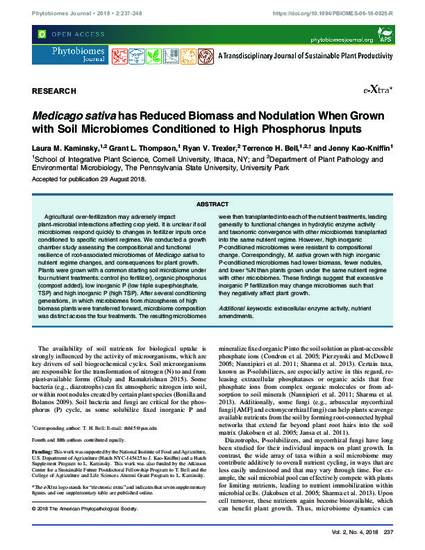
Article
Medicago sativa has Reduced Biomass and Nodulation When Grown with Soil Microbiomes Conditioned to High Phosphorus Inputs
Phytobiomes Journal
(2019)
Abstract
Agricultural over-fertilization may adversely impact plant−microbial interactions affecting crop yield. It is unclear if soil microbiomes respond quickly to changes in fertilizer inputs once conditioned to specific nutrient regimes. We conducted a growth chamber study assessing the compositional and functional resilience of root-associated microbiomes of Medicago sativa to nutrient regime changes, and consequences for plant growth. Plants were grown with a common starting soil microbiome under four nutrient treatments: control (no fertilizer), organic phosphorus (compost added), low inorganic P (low triple superphosphate, TSP) and high inorganic P (high TSP). After several conditioning generations, in which microbiomes from rhizospheres of high biomass plants were transferred forward, microbiome composition was distinct across the four treatments. The resulting microbiomes were then transplanted into each of the nutrient treatments, leading generally to functional changes in hydrolytic enzyme activity and taxonomic convergence with other microbiomes transplanted into the same nutrient regime. However, high inorganic P-conditioned microbiomes were resistant to compositional change. Correspondingly, M. sativa grown with high inorganic P-conditioned microbiomes had lower biomass, fewer nodules, and lower %N than plants grown under the same nutrient regime with other microbiomes. These findings suggest that excessive inorganic P fertilization may change microbiomes such that they negatively affect plant growth.
Keywords
- extracellular enzyme activity,
- nutrient amendments
Disciplines
Publication Date
March 1, 2019
DOI
10.1094/PBIOMES-06-18-0025-R
Publisher Statement
© 2018 The American Phytopathological Society. Posted with permission
Citation Information
Laura M. Kaminsky, Grant L. Thompson, Ryan V. Trexler, Terrence H. Bell, et al.. "Medicago sativa has Reduced Biomass and Nodulation When Grown with Soil Microbiomes Conditioned to High Phosphorus Inputs" Phytobiomes Journal Vol. 2 Iss. 4 (2019) p. 237 - 248 ISSN: 2471-2906 Available at: http://works.bepress.com/grant-thompson/2/
